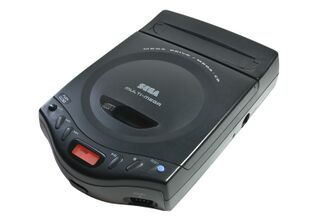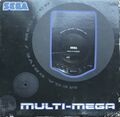Difference between revisions of "Sega Multi-Mega"
From Sega Retro
GerbilSoft (talk | contribs) m |
|||
| Line 1: | Line 1: | ||
| − | + | {{ConsoleBob | |
| + | | consoleimage=Multimega.jpg | ||
| + | | imgwidth=320px | ||
| + | | name=Multi-Mega / CDX / Multi Mega CDX | ||
| + | | maker=[[Sega]] | ||
| + | | europe= | ||
| + | | usa= | ||
| + | | japan= | ||
| + | | australia= | ||
| + | | benelux= | ||
| + | | brazil= | ||
| + | | germany= | ||
| + | | scandinavia= | ||
| + | | southkorea= | ||
| + | }} | ||
| + | The '''Sega Multi-Mega''' is a special piece of hardware developed by Sega and released in the early-1990s. It is a [[Sega Mega Drive]], [[Sega Mega CD]] and personal CD player combined into one unit. The unit was released in North America as the '''Sega Genesis CDX''' as the "Mega Drive" naming scheme was not in use in that region, and in Brazil it was called the '''Multi Mega CDX'''. | ||
| − | It | + | As with any home Mega Drive, the unit needs to be plugged into a television in order for Mega Drive and Mega CD games to be played. It must also be connected to a power supply to be used in this way, however, as a CD player it can also be run on battery power, as the unit was also designed to be portable. Due to the Mega Drive additions, the unit is larger and heavier than most other portable CD players on the market at the time. |
| − | The | + | The Multi-Mega uses the same power adaptor and A/V leads as the Mega Drive model II. These are connected to the right hand side of the unit. Also included is an 1/8" headphone socket, which works for both CDs and games, and a volume control. There is also a line out socket for hooking up to a hi-fi system. |
| − | The | + | The unit features the last version of the Mega CD [[Bios]], v.2.21. Like the Mega CD and the [[Sega Saturn]], it is compatible with [[CD plus G|CD+G]] discs. |
| − | The front of the unit has controller port 1 on the far left, a power button in the middle, and controller port 2 on the far right. | + | The front of the unit has controller port 1 on the far left, a power button in the middle, and controller port 2 on the far right. This spacing breaks compatibility with [[Electronic Arts]]' [[4 Way Play]] multitap peripheral, and the [[Remote Arcade System]]. The functions of both these peripherals can still be obtained through third-party accessories. |
| − | + | New to the Multi-Mega are CD controls seen on the top of the unit. From left to right these functions include; the open button for the CD lid, seek buttons for the CD player, a small LCD screen in the middle displaying the current track number (including which audio track it's currently playing in-game) (or ACCESS when loading a game), play/pause button, a stop button, and a small blue reset button. | |
| − | The | + | In all cases the Multi-Mega was packaged with a [[Control Pad (Mega Drive)|6-button control pad]], a power adaptor, a Red-White-Yellow style A/V cable (probably an RF cable in Europe). North American bundles included ''[[Sega Classics Arcade Collection]]'' (which contains ''[[Streets of Rage]]'', ''[[Columns]]'', ''[[Super Monaco GP]]'', ''[[The Revenge of Shinobi]]'' and ''[[Golden Axe]]''), ''[[Sonic CD]]'' and ''[[Ecco the Dolphin]]'' with the console. In Brazil it was bundled with ''[[Night Trap]]''. |
| + | |||
| + | The unit did not reach Japan as the Multi-Mega, but instead the design was licensed to Linguaphone, who rebranded the unit as the '''Linguaphone Education Gear'''. Very little is known about this version of the unit, though it can be assumed it was intended for education purposes. | ||
| + | |||
| + | Production of the Multi-Mega ceased when the [[Sega 32X]] hit the market, with Sega announcing that the Multi-Mega was a novelty item rather than a console designed for the mainstream audience. Multi-Megas were not designed to be used with the Sega 32X, but are fully compatible. | ||
| + | |||
| + | ==Gallery== | ||
| + | <gallery> | ||
| + | File:Linguaphone.jpg|JP Linguaphone Education Gear model | ||
| + | File:Multimega.jpg|EU model | ||
| + | </gallery> | ||
==Physical Scans== | ==Physical Scans== | ||
<gallery> | <gallery> | ||
File:Sega CDX Box.jpg|US box (front) | File:Sega CDX Box.jpg|US box (front) | ||
| − | File:Multi Mega.jpg|EU box (front) | + | File:Multi Mega EU Box Front.jpg|EU box (front) |
File:MultimegaCDX BR Box Front.jpg|BR box (front) | File:MultimegaCDX BR Box Front.jpg|BR box (front) | ||
File:MultimegaCDX BR Box Back.jpg|BR box (back) | File:MultimegaCDX BR Box Back.jpg|BR box (back) | ||
| + | File:MultiMega Asia NTSC Box Front.jpg|Asian box (NTSC) (front) | ||
</gallery> | </gallery> | ||
{{MegaDrive}} | {{MegaDrive}} | ||
[[Category:Mega Drive Hardware]] | [[Category:Mega Drive Hardware]] | ||
Revision as of 10:40, 13 February 2011

|
| Multi-Mega / CDX / Multi Mega CDX |
|---|
| Manufacturer: Sega |
The Sega Multi-Mega is a special piece of hardware developed by Sega and released in the early-1990s. It is a Sega Mega Drive, Sega Mega CD and personal CD player combined into one unit. The unit was released in North America as the Sega Genesis CDX as the "Mega Drive" naming scheme was not in use in that region, and in Brazil it was called the Multi Mega CDX.
As with any home Mega Drive, the unit needs to be plugged into a television in order for Mega Drive and Mega CD games to be played. It must also be connected to a power supply to be used in this way, however, as a CD player it can also be run on battery power, as the unit was also designed to be portable. Due to the Mega Drive additions, the unit is larger and heavier than most other portable CD players on the market at the time.
The Multi-Mega uses the same power adaptor and A/V leads as the Mega Drive model II. These are connected to the right hand side of the unit. Also included is an 1/8" headphone socket, which works for both CDs and games, and a volume control. There is also a line out socket for hooking up to a hi-fi system.
The unit features the last version of the Mega CD Bios, v.2.21. Like the Mega CD and the Sega Saturn, it is compatible with CD+G discs.
The front of the unit has controller port 1 on the far left, a power button in the middle, and controller port 2 on the far right. This spacing breaks compatibility with Electronic Arts' 4 Way Play multitap peripheral, and the Remote Arcade System. The functions of both these peripherals can still be obtained through third-party accessories.
New to the Multi-Mega are CD controls seen on the top of the unit. From left to right these functions include; the open button for the CD lid, seek buttons for the CD player, a small LCD screen in the middle displaying the current track number (including which audio track it's currently playing in-game) (or ACCESS when loading a game), play/pause button, a stop button, and a small blue reset button.
In all cases the Multi-Mega was packaged with a 6-button control pad, a power adaptor, a Red-White-Yellow style A/V cable (probably an RF cable in Europe). North American bundles included Sega Classics Arcade Collection (which contains Streets of Rage, Columns, Super Monaco GP, The Revenge of Shinobi and Golden Axe), Sonic CD and Ecco the Dolphin with the console. In Brazil it was bundled with Night Trap.
The unit did not reach Japan as the Multi-Mega, but instead the design was licensed to Linguaphone, who rebranded the unit as the Linguaphone Education Gear. Very little is known about this version of the unit, though it can be assumed it was intended for education purposes.
Production of the Multi-Mega ceased when the Sega 32X hit the market, with Sega announcing that the Multi-Mega was a novelty item rather than a console designed for the mainstream audience. Multi-Megas were not designed to be used with the Sega 32X, but are fully compatible.






